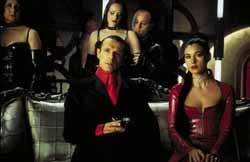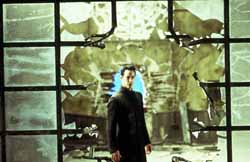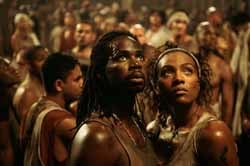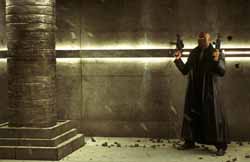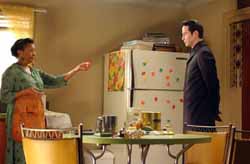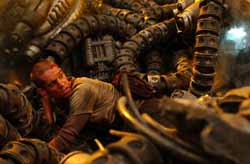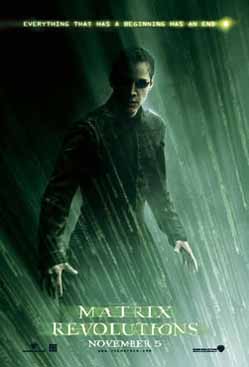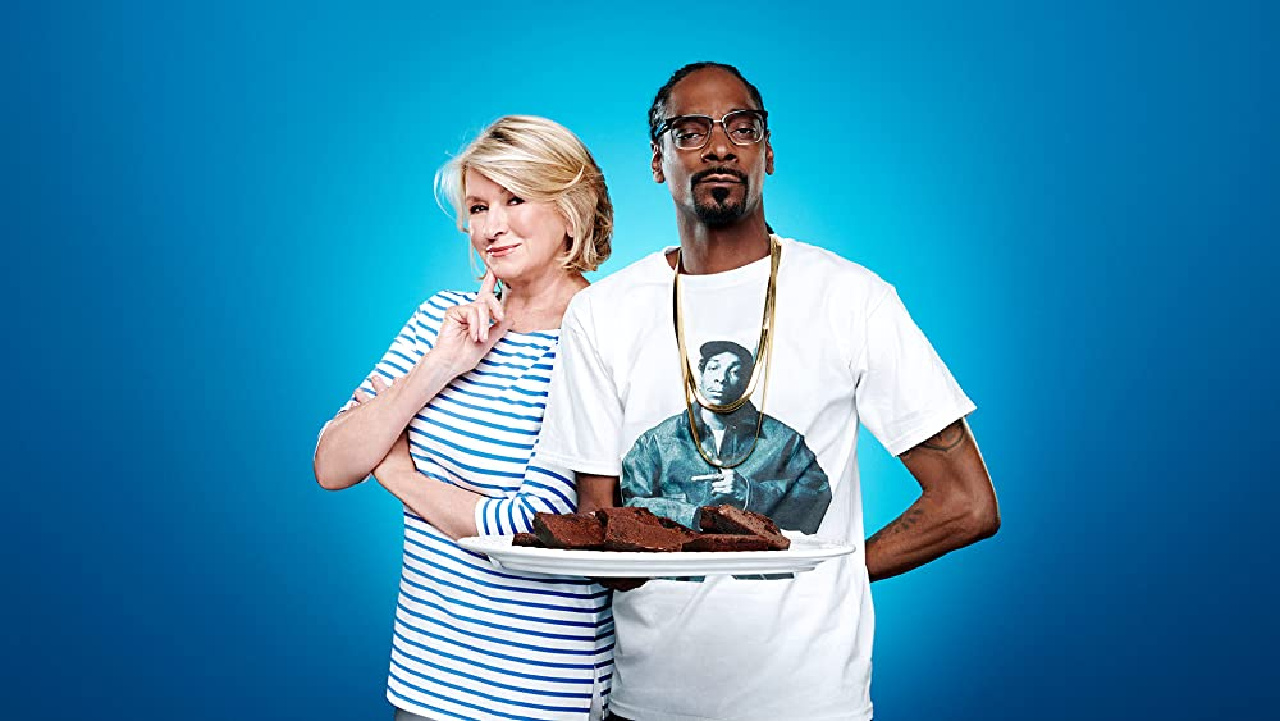I think I liked The Matrix better when the solution was still unknown. Before Reloaded, before Revolutions, back when an unexpected little movie blew us all away and left us wondering if maybe, just maybe Trinity and Morpheous could be waiting on the other end of our cell phone; waiting to open our eyes to the truth about the world pulled over our eyes. Back when the Matrix itself was a dark and hyper-real place where every step was a new revelation. Back when the Wachowski's ended their movie by convincing us that Neo was planning something grand and then left us all alone to imagine for ourselves just what that was.
Third and final in the Matrix series, Revolutions wipes all of those delicious possibilities away with a straightforward, by the numbers story. Yes, it ties the series up in a nice little bow and answers most of the big questions (yet virtually none of the smaller ones) that the previous two movies had us wondering. I simply question whether we might not have all been happier had those questions never been addressed.
Picking up mere seconds after the previous movie, Matrix Revolutions finds Neo (Keanu Reeves) unconscious and the last human city, Zion, quickly running out of time. Though I think I prefer Reloaded as a movie, Revolutions does do some things better, like getting to the point. There's no need for setup or more out of place partying, so Morpheus (Laurence Fishburne) and Trinity (Carrie-Anne Moss) hop right into the Matrix to figure out what's wrong, hook up with the Oracle's (Mary Alice) guardian Seraph (Sing Ngai), and start kicking ass.
Neo has somehow become trapped between the real world and the machine world, the whys and hows of which are never at all explained. He awakens in a train station, owned by the smarmy French villain from Reloaded, the Merovingian (Lambert Wilson). That leaves Trinity, Morpheous, and Seraph to have a word with the "Merv" in a very cool and disturbing underground BDSM club appropriately named "Hell".
However, despite the fact that Revolutions wastes less time getting to the point, it actually feels like there are fewer action scenes this time out. Revolutions mixes in a few action scenes and a lot of talking scenes, then a lot of action scenes and another pause for more talky scenes. What is it with today's blockbuster that make it SO INCAPABLE of engaging in character development and action all at the same time? Why do we have to PAUSE to have an OBVIOUS character building moment? Why can't we build character in the heat of battle? That's where a man is defined and I'm not just talking about standing and shouting expletives while shooting things.
What bothered me more than anything is that no one in the movie (let alone in the audience) seems to have the faintest clue about what is going on. There isn't even an attempt to understand the frankly CRAZY things that start happening to Neo, nor does anyone question what the heck he's doing. Everything that happens in Revolutions happens because the series needed to get to an end point, not because the movie is following the logical progression set out by its predecessors. Characters (like the Merovingian) and smaller plot lines are thrown to the wayside to reach that goal. A lot is said, but never explained; throwaway lines, which seem to foreshadow deeper more interesting are simply abandoned to keep the movie rolling.
For every bit of annoyance in Revolutions there's still so much to love. Yes, the Merovingian and his wife Persephone (one of the highlights of Reloaded) are tossed to the wayside. But the scene in which they do appear is unforgettable in it's own way. Persephone's outfit alone is likely to stir something inside male viewers.
Revolutions also doesn't shy away from sacrifice in achieving its goal. Everything doesn't turn out rosy, but somehow the characters deal and push on for survival. The relationship between man and machine is particularly well defined in this film, and the machines are given at least some measure of understanding. Reloaded hinted at a symbiosis between the species, and Revolutions pushes that concept even further. In a particularly poignant scene, one program addresses the subject of love among machines, explaining that love is just a word for a concept, not a feeling proprietary to humans.
Finally, when the machines actually invade Zion (as we all knew inevitably they would), the Wachowski's really hit a breathtaking stride. The battle there, despite involving only minor, johnny-come-lately characters, is hard hitting and desperate. The human struggle for survival is palpable and that annoying kid who had two throwaway lines in the first movie manages to do something useful. Maybe it is a little ridiculous for one guy in a robo-suit to be able to hold off that many Sentinels for that long (you'll know what I mean when you see it), but watching him do it, how ever unbelievable, is visual poetry.
What will amaze you is the sheer level of detail the Wachowski brothers have put into this one. The battle for Zion doesn't just feature a bunch of guys in power suits shooting at squiddies. In just a few minutes, Revolutions manages to give a face to everyone involved, from the guy running ammunition with a wheelbarrow, to the rocket-toting foot soldiers skulking around down below, waiting for machine diggers to break through.
More than the previous two, Revolutions is all about spectacle. It pulls that off even if, except for the amazing battle for Zion, it doesn't really show us anything we haven't already seen in the other two movies. You won't see anything in Revolutions for instance, that can even come close to topping Reloaded's highway chase. Even Revolutions' big in-Matrix gun battle is basically a less interesting clone of the lobby battle towards the end of the original movie. There is a pretty interesting air fight between Neo and Smith that takes place in the rain... but it's so obscured by excessive amounts of water, that it isn't as exciting as you might think it would be. Full credit though to Hugo Weaving, who does his Agent Smith best to throw some finely tuned robo-emotion into the thing.
Weaving has done such a great job of becoming the show stopper in this series. His performance throughout has been the most consistently welcome part these movies. Somewhere along the way he became the REAL star of the Matrix, and he deserves every moment he can get in the spotlight. Smith is the breakaway character from all three movies, and long after they've faded away from box office memory, I have a feeling that his work there, as a villain nearly on the level of Darth Vader, will be what lingers most strongly in our heads.
In the end, Revolutions delivers well enough as an ending to the familiar friend this franchise has become. It is also smart enough to leave us with possibilities for the future of the humans in this Matrix world rather than a clearly laid out path. Perhaps that's the best we could hope for, from a pair of sequels doomed to be compared to an innovative and fantastic movie like the original. What Revolutions does is leave it's mark as something fun and cool. It doesn't manage to mix in the sharp, reality bending sci-fi watermarks of the first one, nor does it tackle the deep philosophical questions of the second one. It does remain extremely entertaining. I guess I'm happy with that as a way to say goodbye.
